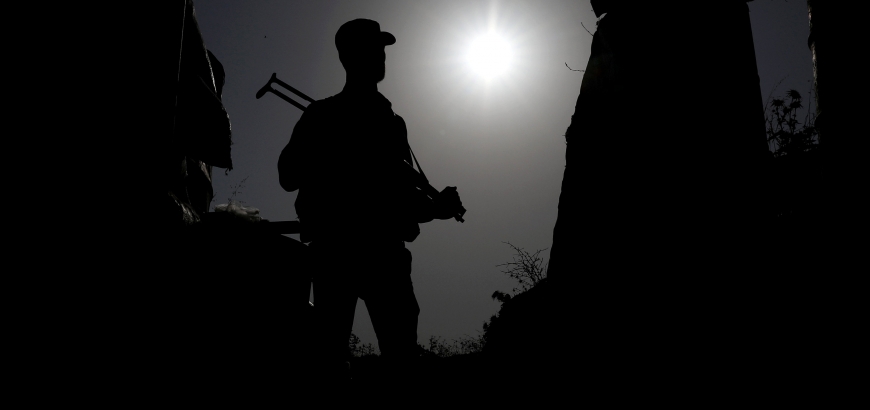On Tuesday, clashes broke out in the town of Kharaba in Suweida province, between groups of the Fifth Corps, a part of the regime forces, which is backed by Russia,. The clashes lasted for hours and ended with one group being eliminated.
The reasons for the clash between the two groups within the same unit, which is run by Russian officers, were related to two main causes: The first was related to violations against Christian civilians, and the other related to land and property purchases for prominent Shia figures in southern Syria.
Local sources told Alsouria Net that the clashes occurred between groups under the authority of Ahmed al-Awda, the commander of the Shabab al-Sunna (“Sunni Youth”) forces, who was formerly part of the Free Syrian Army, and now the commander of the Southern Brigade in the Fifth Corp, and other groups under the authority of Samer al-Hamad, known as “Abou Saddam al-Bedawi,” a former commander in the Shabab al-Sunna forces and currently the commander of the military police within the Southern Brigade in the Fifth Corps.
The sources said that the clashes occurred as a result of al-Hamad’s groups attacking a number of Christian residents in the town of Kharaba earlier in the week, adding that a delegation of residents from the village submitted an official complaints to the Russian army’s operation’s headquarters in Daraa a month earlier, and called for the village to be cleared of the armed presence.
The same sources said that groups under Awda imposed checkpoints at the entrance of the village and on the roads leading up to it, which led Hamad to attack one of these checkpoints and kill one of Awda’s fighters. After this, heavy clashes broke out, in which light and medium weapons were used, and which ended with Awda’s groups taking control of the village and arresting all of Hamad’s forces, who numbered about 35 men, after their commander fled to an unknown location.
“Demographic change”
Sources from inside the village of Kharaba told Alsouria Net that the commander in the Fifth Corps, Samer al-Hamad, had deliberately insulted the residents of the village in recent years, with his heated attempts to try to establish demographic change there by forcing a number of residents from their homes and then bringing in new residents from his tribe and settling them in the village. This made his presence and the presence of his fighters a threat to the village’s residents.
They also said that Hamad had “been working openly to deal drugs and hashish. Awda’s groups, which took control of the village, stormed a number of storehouses used to keep these items and confiscated them.”
According to what Alsouria Net learned, the complaints by the residents of Kharaba to the Russian forces were not the only reason for Awda attacking Hamad’s men and eliminating them. Hamad was also accused by armed opposition groups of running one of Awda’s notorious security prisons, when they had control of the south, which had been called Branch 600, and was in the Bosra al-Sham historic citadel.
Land Purchase
Informed sources, who asked not to be named for security reasons, told Alsouria Net about a two day long meeting that was held in the town of Bosra al-Sham, Awda’s main base, which included town notables and a number of activists as well as service figures in the home of Awad al-Mikdad, a prominent town notable.
According to the sources, the meeting discussed Hamad’s attempts to sell land and stores in the town and on its outskirts and in the neighboring village of Kharaba to unknown parties. It also discussed the need to curb these behaviors and those behind them.
Alsouria Net viewed a record of the meeting, which explicitly stated that residents from the town of Bosra al-Sham, who belonged to the Shia sect and who are pro-Iran, were behind a project to purchase land. It was decided during the meeting to form a council of 20 people from the town to follow up on the issue and to regain the land which had recently been sold, as well as begin the process of forcibly expelling the Bedouins who had taken up residence on this land.
The meeting notes said that the “military command” was interested in implementing the city’s interests, in a clear reference to Awda’s approval of the deal that had been reached. The attendees also agreed to hold a series of other meetings to follow up on the implementation of the decisions.
According to sources, what mostly pushed Awda to eliminate one of the most prominent of his men was Hamad selling land and property to pro-Iranian Shia figures from Bosra al-Sham, who had been trying, since the regime took control over the south in June, to dominate the town in various ways and to end Awda’s control over it. Awda has rejected this and tried to derail their attempts and to end those who have helped them.
It seems that Iran’s ambitions in southern Syria have begun to take another course, aside from their military presence, which could conflict with the regional interests of Jordan and Israel. In its new policy, it has tried to create an alternative to a military presence through local residents and has begun to spread Shi’ification and buy land to preserve a foothold in the region in case it is one day forced to depart the area militarily.
This article was translated and edited by The Syrian Observer. Responsibility for the information and views set out in this article lies entirely with the author.


